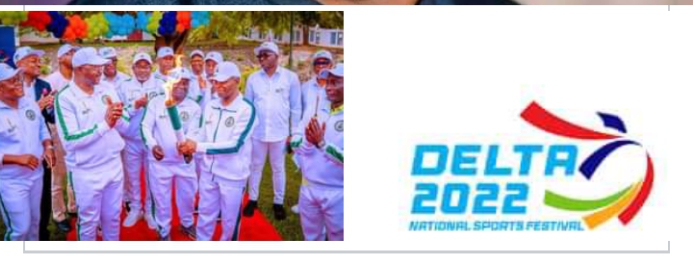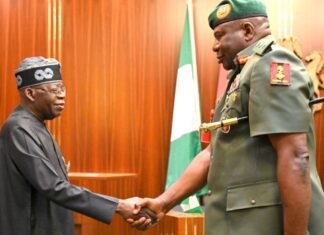Makurdi, the capital of Benue State, hosted the NSF in 1996. By this time, Bendel State had been divided into Edo and Delta State
By Uzor Odigbo
As the National Sports Festival kicks off on Wednesday in Asaba, Delta State,
Most states in the federation should be commended as Heroes of Sports Festival Hosts.
States like Lagos, Delta, Edo, Rivers, Kaduna, Benue, Bauchi, etc have hosted the event on two to three occasions.
These landmark feat has helped in fostering unity and sports development in the states concerned.
Delta, Lagos and Edo states are already leveraging on the hosting of the games multiple times to develop sports and churned many Athletes who are today national sports heroes and heroines.
The objectives of the National Sports Festival remain the Unity of Nigeria.
READ ALSO
Delta 2022 begins on Wednesday as Athletes arrive Asaba
In the end, the reality is that after the Nigerian Civil War in 1970, the unity of the country was seriously threatened. The then Head of State, General Yakubu Gowon, initiated the National Sports Festival in 1973 as a platform to bring together youths from all parts of the country to compete, using sports as a tool to achieve national healing after the brutal 30-month civil war.
The sports festival as corroborated by Guardian Newspaper became a rallying point for national unity and cultural integration. It was named the Unity Games.
The maiden edition of the NSF took place in 1973 at the National Stadium, Surulere, Lagos. For the first after the civil war, athletes from all nooks and crannies of the country came together to felicitate and compete in a peaceful atmosphere.
The then Midwestern State, under the administration of sports-loving Military Governor, Brigadier Samuel Osaigbovo Ogbemudia, won the inaugural edition, beating the host, Lagos, to emerge the overall winner.
A majority of the athletes represented the country in the third All-Africa Games held in Algeria.
The second edition also took place in Lagos in 1975 and was won by the then Midwestern State.
The festival was moved to Kaduna in 1977, and Bendel State, which came into being following the creation of States in 1976 by Murtala Mohammed’s administration. Bendel state topped the medals table.
The city of Ibadan, Oyo State, hosted the 1979 edition tagged ‘Oluyole ’79, and Bendel State also finished top on the medals table. In 1981, Benin City, the capital of the then Bendel State hosted the NSF for the first time, and Bendel State finished top on the medals table.
After Bendel ’81 edition, the NSF suffered its first postponement in 1983 due to what sports ministry officials described then as an “unclear political atmosphere” after a military coup.
The National Sports Festival did not hold in 1983 as scheduled, and there was also no festival in 1984. The city of Ilorin, Kwara State, hosted the 1985 edition.
At Kwara ’85, the junior and intermediate cadres (football) were not allowed to take part in the National Sports Festival after they formed the Golden Eaglets to win the maiden FIFA Kodak U-16 Tournament in China.
The NSF did not hold as scheduled in 1987. Rather, it took place in 1988 in Port Harcourt. Bendel State finished top of the medals table at Rivers ’88.
To bridge the gap, Lagos State offered to host the NSF the following year (1989) and finished top of the medals table. The next edition of the NSF took place in Bauchi in 1991 and was nearly marred by religious violence, which broke out a few days after it commenced. In the end, Zone 2, which comprises Bendel, Ondo and Rivers State finished top of the medals table.
After Bauchi ’91, the National Sports Festival suffered one of its worst postponements. It didn’t hold in 1993, 94 and 95. Makurdi, the capital of Benue State, hosted the NSF in 1996. By this time, Bendel State had been divided into Edo and Delta State, following the creation of more states by General Ibrahim Babangida’s administration in August 1991. Lagos State finished on top of the medals table at Makurdi ’96.
There was stability, as the NSF returned to its biannual arrangement. Owerri, the capital of Imo State hosted the 1998 edition which was won by Lagos State. Nigeria returned to a democratic government in 1999, and a year later, the NSF returned to Bauchi State.
Team Delta, under the Chief James Ibori administration, finished on top of the medals table at Bauchi 2000 with Chief Solomon Ogba as Commissioner for Sports.
Benin City hosted the NSF for the second time in 2002, with Team Edo finishing top of the medals table. The festival moved to Abuja in 2004, which Team Delta won. Delta successfully defended the NSF title two years later at Gateway 2006, Ogun State.
Thereafter, the festival suffered a one-year postponement solicited for by the Kaduna State government to enable it to complete its facilities. Instead of hosting the event in 2008, the KADA Games was held in 2009.
Team Delta, under Dr. Emmanuel Uduaghan’s administration, topped the medals table.
Rivers State hosted the National Sports Festival for the second time in 2011. Tagged The Garden City Games, Team Rivers finished on top of the medals table.
Lagos State played host to the NSF in 2012 (just one-year interval) to honour the agreement it entered with the Sports Ministry during the bidding process in Kaduna, and Team Delta finished top of the medals table.
Cross River State won the bid to host the 2014 edition of the NSF. But Nigerian youths waited until 2018 for the festival to hold in Abuja after ‘the Centenary Games,’ which was meant to commemorate Nigeria’s 100 years, could not see the light of day in Calabar.
Abuja 2018 saw Team Delta, under the administration of Dr Ifeanyi Okowa finishing on top of the medals table with Chief Tonobok Okowa as Chairman of the Sports Commission.
Benin City, Edo State, hosted the NSF for the third time in 2020, but the outbreak of the dreaded COVID-19 pandemic forced the Games to be moved to 2021. And to prove that the victory at Abuja 2018 was not a fluke, Team Delta finished top of the medals table.
The stage is set for Delta 2022, and Governor Ifeanyi Okowa says he would host a festival that all athletes and officials will be proud of.













